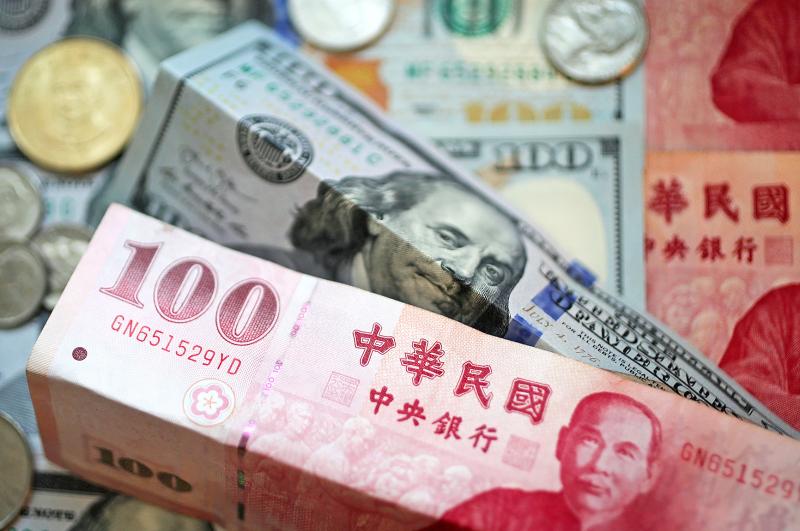Fund outflows from Taiwan reached a record high in the first quarter of this year, marking the 47th consecutive quarter of cash transferring out of the country, as the central bank attributed the pattern to overseas bond investments by Taiwanese financial institutions.
It was the third straight quarter that Taiwan reported record high fund outflows.
Data compiled by the central bank showed net outflows in Taiwan’s financial account — which measures the flow of direct investment and portfolio investment — totaled US$32.22 billion in the January-to-March quarter, up from US$18.56 billion a year earlier.

Photo: CNA
The first quarter’s fund outflow also beat the US$31.78 billion recorded in the fourth quarter of last year, the central bank’s statistics showed.
A spike in US Treasury yields prompted many Taiwanese financial institutions to park funds overseas after the US Federal Reserve introduced a rate-hike cycle that began in March, bank officials said.
The increase in net fund outflows came after portfolio investments abroad posted a net asset increase of US$49.92 billion, as insurance companies raised their investment in debt securities overseas, they said.
Out of the US$49.92 billion, residents’ portfolio investment abroad posted a net increase of US$35.21 billion on the back of a rise in overseas debt securities investment by insurance companies as well as other financial institutions, bank officials said.
Non-residents’ portfolio investment recorded a net fall of US$14.72 billion, as foreign investors reduced equity holdings in the local stock market in the first quarter, when the TAIEX shed 525.37 points, or 2.88 percent, after foreign institutional investors sold a net NT$459 billion (US$15.48 billion).
Over the past 47 quarters, accumulated net fund outflows hit US$660.51 billion, equivalent to more than seven years of Taipei’s tax revenue.
Addressing concerns that investors could continue to move funds out of the country and into US dollar-denominated assets, the central bank said that net financial account outflows are common among countries like Taiwan, which have a long-term current account surplus.
Other countries, like Japan, Singapore, South Korea and Germany, which have all had such a surplus, have also tended to record net financial account outflows, the bank said.
A current account mainly measures exports and imports of merchandise and services.
Taiwan in the first quarter recorded a current account surplus of US$30.68 billion, up US$4.85 billion from a year earlier, reporting a US$20.47 billion surplus in commodity trade, up US$1.7 billion from a year earlier, due to solid global demand for technology products amid a digital transformation.
Additionally, service trade reported a surplus of US$4.34 billion, a new quarterly high, due to increases in cargo shipping revenue amid tight supply, the central bank said.
Meanwhile, the central bank’s reserve assets rose only US$260 million, as the bank entered the foreign exchange market by selling US dollars to cap the depreciation of the New Taiwan dollar against a strong greenback.

NEW IDENTITY: Known for its software, India has expanded into hardware, with its semiconductor industry growing from US$38bn in 2023 to US$45bn to US$50bn India on Saturday inaugurated its first semiconductor assembly and test facility, a milestone in the government’s push to reduce dependence on foreign chipmakers and stake a claim in a sector dominated by China. Indian Prime Minister Narendra Modi opened US firm Micron Technology Inc’s semiconductor assembly, test and packaging unit in his home state of Gujarat, hailing the “dawn of a new era” for India’s technology ambitions. “When young Indians look back in the future, they will see this decade as the turning point in our tech future,” Modi told the event, which was broadcast on his YouTube channel. The plant would convert

‘SEISMIC SHIFT’: The researcher forecast there would be about 1.1 billion mobile shipments this year, down from 1.26 billion the prior year and erasing years of gains The global smartphone market is expected to contract 12.9 percent this year due to the unprecedented memorychip shortage, marking “a crisis like no other,” researcher International Data Corp (IDC) said. The new forecast, a dramatic revision down from earlier estimates, gives the latest accounting of the ongoing memory crunch that is affecting every corner of the electronics industry. The demand for advanced memory to power artificial intelligence (AI) tasks has drained global supply until well into next year and jeopardizes the business model of many smartphone makers. IDC forecast about 1.1 billion mobile shipments this year, down from 1.26 billion the prior

People stand in a Pokemon store in Tokyo on Thursday. One of the world highest-grossing franchises is celebrated its 30th anniversary yesterday.

Zimbabwe’s ban on raw lithium exports is forcing Chinese miners to rethink their strategy, speeding up plans to process the metal locally instead of shipping it to China’s vast rechargeable battery industry. The country is Africa’s largest lithium producer and has one of the world’s largest reserves, according to the US Geological Survey (USGS). Zimbabwe already banned the export of lithium ore in 2022 and last year announced it would halt exports of lithium concentrates from January next year. However, on Wednesday it imposed the ban with immediate effect, leaving unclear what the lithium mining sector would do in the